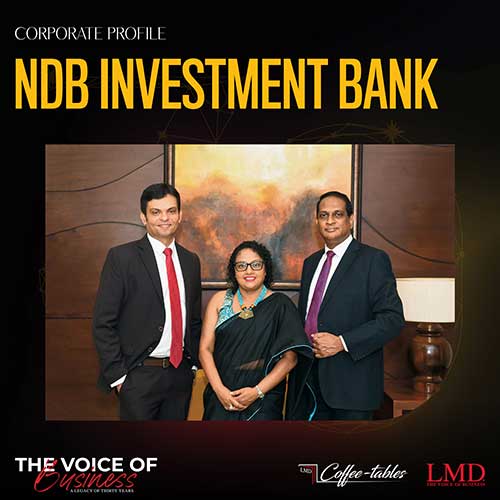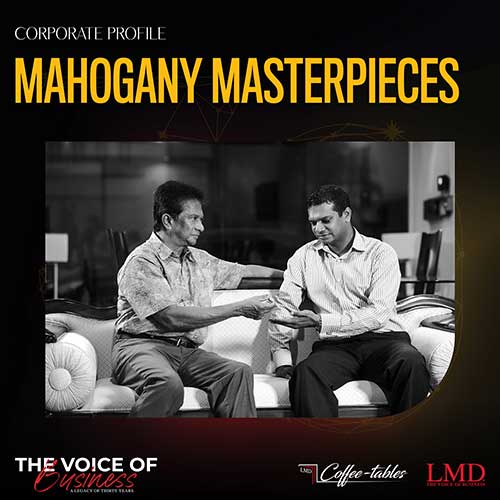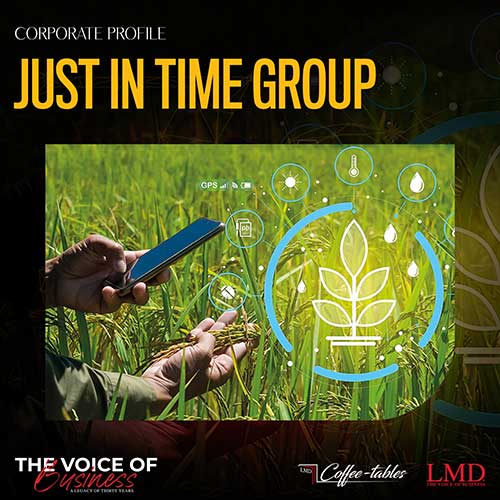REFLECTIONS
FROM THE SECOND DECADE
A selection from LMD’s Cover Stories
SEPTEMBER 2006
SMALL STEP, GIANT LEAP
Realistically assessing his oeuvre, Anoma Pieris essays the suggestion that the idealism of Jayantha Dhanapala is the need of the hour for a planet in peril

For a small planet plagued by numerous wars, myriad conflicts and a host of other issues, anti-terrorism campaigner Jayantha Dhanapala is perhaps the world’s last, best hope to defeat terrorism.
In the flush of early youth, many Sri Lankans may have dreamed – somewhat unrealistically – about becoming astronauts. Man’s first steps on the moon in the late 1960s may have fuelled those ambitions. One young man of a previous generation however, had more earthbound aspirations.
The author, at the relatively tender age of 17, of a seminal (for him, at least) piece titled ‘The World We Want,’ he harboured hopes of a more practical contribution to humanity. And age has not withered nor custom staled his desire to leave the world a better place than he found it.
“Except for the giants in history, most of us leave behind footprints in the sands of time – collectively though,” mused Jayantha Dhanapala recently. “What we leave behind in institutions remains greater than all our individual contributions put together,” he affirmed.
With a distinguished career that spans 40 years, he is perhaps in a better position than most to essay such an enterprise. And the best may be yet to come. For long ‘our man in the UN,’ this international diplomat is in the running for arguably the world’s most important job.
The problem is, not everyone quite sees him the way many Sri Lankans do. Some don’t even agree that – according to the well-established convention of regional rotation, at least – it is Asia’s turn after a lapse of 35 years; the last Asian to occupy the chair of the United Nations Secretary-General (UNSG) being the then Burma’s U Thant.
It is little use informing detractors that the planet’s largest continent is home to 60 percent of humanity, contains 30 percent of global land mass and generates 25 percent of the world’s economic output. It is of less use educating people on Sri Lanka’s impressive track record of a 75-year-old participatory democracy (the UN is only 61), moderate stance on world politics and excellent relations with virtually all nations. Being a founder member of the Non-Aligned Movement (NAM) and striking a balance vis-à-vis global economics through NAM, playing a dynamic and constructive role in the Commonwealth while fostering greater regional cooperation via the South Asian Association for Regional Cooperation (SAARC) – even to the extent of urging SAARC members to bond more strongly with other world groupings such as ASEAN and the EU – will not cut any ice with the critics who claim that Dhanapala is not necessarily the best man for the job.
The recent straw poll – in which the UN’s permanent members voted for the four Asian candidates, casting ballots indicating ‘Encourage,’ ‘Discourage’ or ‘No Opinion’ against each name – was an apocalypse: Dhanapala was the last of the four horsemen, securing only five ‘encouragements,’ with six ‘discouragements’ and four ‘no opinions’ (5:6:4). India’s Shashi Tharoor got 10:2:3 while Thailand’s Surakiart Sathirathai and South Korea’s Ban Ki-moon scored 7:3:5 and 12:1:2 respectively.
It’s not rocket science, really. It’s world politics. It’s the fact that the nuclear hotspot that is the Koreas – for the moment anyway – is more important to the Security Council and the UN’s 15 permanent members than a backwater war in a small island nation.
But there is no gainsaying that Sri Lanka, a member of the UN since 1955, has “played an active role in translating the ideals of the UN into intergovernmental policy” over the decades… especially with regard to human rights, disarmament and the law of the sea. And it is the country’s proactive approach to preempting child recruitment that has received recognition among the UN’s own crusaders in this sphere.
Herein lies hope for Sri Lanka, Asia and the world at large. At no other time in human history has the spectre of terrorism loomed so menacingly as now. As a seasoned campaigner contra nuclear proliferation and with no mean experience heading a vital negotiating effort to secure peace in his own homeland, Dhanapala is the ideal candidate to assume the mantle of UNSG on a planet plagued by New Yorks (9/11), Londons (3/11), Madrids (7/7); by Balis and Lebanons; and yes, by Sri Lankas that are now taking its internal wars to the world. And Sri Lanka’s contender is not fazed by the straw poll. “The results are not definitive. The poll is no indication as to what the ultimate choice will be,” he said in the aftermath of the poll.
One also gets the strong impression that Dhanapala himself is – true to the motto of his alma mater Trinity College (‘Respice finem’ – ‘Look to the end’) seeing the sands of time on which the next UNSG’s stamp will be writ large. For the planet survives in perilous times, sorely in need of the kind of visionary, idealistic and purpose driven leadership that only a man of rare calibre can provide.
The UNSG’s post will be a small step for Dhanapala – and a giant stride for the world…
SMALL STEP At a time when warring nations and economic ideologies have been replaced by internal conflicts on religious and racial grounds, and global boundaries are being drawn and redrawn in the interest of capitalist expansion, the UN must necessarily represent the mechanisms for maintaining a well-balanced global conscience.
But the reality is that the UN’s relationship with the US, which has never been smooth, will continue to determine the direction it can and cannot take – and the candidates for UN Secretary-General will necessarily be evaluated accordingly. The selection of the candidate will depend on gaining nine out of 15 votes from members of the UN Security Council including the five permanent members.
Debates over the appointments have raged fast and furious, with both Russia and China insisting on an Asian candidate, while the US and the UK stress diplomatic competence. Thailand, India, South Korea and Turkey join Sri Lanka in the competition for this prestigious position, with lobbying for support occurring across the region within South Asia and among ASEAN countries.
The appointment will ultimately be politically underwritten by the preferences of the permanent members. These are some of the issues that Sri Lanka must confront as it continues to campaign for perhaps the most important position that a Sri Lankan – or anyone else for that matter – could ever hope to hold.
One might argue that Sri Lanka is in fact a microcosm of the state of the world. Armed conflict, poverty and ecological destruction have haunted this geography in the past two decades, with the war and the tsunami combining to heighten its economic duress.
Our candidate, Jayantha Dhanapala, knows only too well the implications of these critical issues for a developing country. Beginning in 2004, he headed the Secretariat for Coordinating the Peace Process and was later made senior advisor to the president. But his most important work has been in addressing an issue that can have tremendous humanitarian costs both at home and abroad: the need for nuclear disarmament.
In a comment to the International Herald Tribune on 23 May 2001, Dhanapala outlined what he believes to be the most pressing issues facing us today. Ecology, poverty and disarmament are – in his view – three interlinked themes that are vital to preserving the human future.
The UN objectives of adopting the Kyoto Protocol, halving the numbers living in absolute poverty by 2015 and ending the arms race are, to him, critical objectives for the new millennium. But his personal interest as Under-Secretary-General for Disarmament Affairs from 1998-2003 was to address the threats of nuclear proliferation, the circulation of small firearms and as the charter put it, “limit the diversion for armaments of valuable economic resources.”

The UN’s Millennium Declaration – now over six years old – necessarily stressed humanitarian agendas, the provision of equal rights, and opportunities within systems of democratic and participatory governance. Although laudable aims, the success of such projections would depend on compliance with arms control and disarmament treaties – most specifically in Dhanapala’s view, by preventing the kind of destruction that nuclear war, or biological or chemical warfare, portends. It was a timely observation.
Dhanapala was describing the fallout from the post-Cold War decades. India and Pakistan had crossed the nuclear threshold; there was what is described as a revolution in military affairs; and child soldiers numbered over 300,000. These were the problems facing the UN at that time. Only months later, the implications of armament would be brought to the fore with the events of 9/11.
Speaking at the Threshold Foundation in 2002, Dhanapala described the rising climate of fear as the darker side of globalisation. In his view, the US – as the world’s only military and economic superpower – would from now on bear an added responsibility to demonstrate how globalisation and democracy might work positively together.
The challenges for the new millennium were not limited to the roles played by nation states in their resolution of internecine conflicts or their representative bodies in the UN. In Dhanapala’s view, civil society in the form of NGOs, philanthropic institutions and ordinary citizens would also need to play a role in shaping the future.

What kind of institution would Dhanapala represent if he was chosen for the post of Secretary-General?
The answer is not a simple one. The UN stood for multilateral cooperation and cooperative security following the end of bipolar confrontation; but over the years, its peacekeeping objectives have been severely tested by numerous global conflicts – including the Iraqi invasion of Kuwait, and conflicts in Bosnia, Somalia, Afghanistan, Chechnya, East Timor and the Congo.
The role of the UN has increasingly come into question and more recently, in a time of preemptive strikes and the war in Iraq, the role it plays in maintaining collective security has been considerably eroded. Will the UN’s role be confined to that of an international NGO providing disaster relief and monitoring ecological excesses or will it continue to grow in the role it was designed for – that of ensuring collective security and providing preventive diplomacy? Any steps taken in the direction of UN reform must undoubtedly address the spectre of global terrorism. These are our questions for the Sri Lankan candidate.
Dhanapala will have no difficulty in responding to such queries. His work covers diverse issues including UN reform; multilateralism; peace security and disarmament; small arms; human rights, democracy and governance. He has also covered the more familiar objectives of the UN such as development equity and poverty reduction, gender, education, the environment, culture and the arts, guiding principles and civil society.
They arguably provide the intellectual armature necessary to inform a future Secretary-General and any concerned citizen of the world. Many of Dhanapala’s papers were delivered at prestigious institutions and international meetings, including the United Nations General Assembly, and the Non-Aligned Movement and Commonwealth conferences. Dhanapala has also published books on multilateral diplomacy and disarmament, particularly in relation to China and the Third World.
Indeed, Dhanapala’s most important accolades have been received in peace and disarmament – an area which he appears to be passionate about and to which he has devoted much of his energy. He has headed several organisations that hold multilateral diplomacy and nonproliferation as their primary objective. He has also been appointed to the Weapons of Mass Destruction Commission launched by the government of Sweden under the chairmanship of Dr. Hans Blix. At a time when issues of disarmament appear to be unfashionable, he has been someone who dared to confront difficult issues. This is unquestionably the kind of engagement needed in the next Secretary-General.
More importantly, Dhanapala offers a reflective and considered response regarding the future of the UN, which is worth outlining here. It is perhaps an extension of an attitude nurtured early in his life, when an essay on ‘The World We Want’ – written at the age of 17 – won him an opportunity to travel to the US to meet President Dwight Eisenhower and Senator J. F. Kennedy in 1957. His diplomatic career seems almost a natural outcome of a desire to enable that initial objective.

Dhanapala identifies one of the problems facing the UN as being the evolution of the global system from a bipolar to a unipolar system and the projection of state sovereignty as absolute. Accordingly, intervention would become necessary when a state abrogated its responsibility towards its people.
While the criteria for such action was governed by international law, it was important that the UN discouraged unilateral action. In Dhanapala’s mind, the first challenge was in understanding how to restore equilibrium within a system while accepting the realities of power asymmetry in the world.
The second was to link the principal organs of the UN – which in his view, had become increasingly compartmentalised – so that the cross-circulation of ideas could occur.
Thirdly, recognising that the concept of security has expanded beyond military issues to include social, political and economic factors, such as the prevention of AIDS and women’s rights. Dhanapala also made a number of proposals relating to disarmament and dealing with international terrorism. He believes that the UN could play an important role in combatting weapons of mass destruction terrorism by safeguarding nuclear material so that it can be used for providing energy rather than producing weapons.
The position of the UN Secretary-General is not one that can be romanticised in any way. One cannot underestimate the challenges and difficulties that come with such a position of responsibility. It demands considerable intellectual acuity, coupled with equanimity, presence of mind and personal sacrifice.
Yet, fundamental to such a position is a belief in the UN as an institution – one that can provide a common ethical base and shape a world order based on policies beyond individual profit or national interest. These are the convictions voiced by Dhanapala as fundamental to the UN’s future.
In the current climate of globalisation, de-territorialisation and the war on terrorism, such values are hard to come by. Some may even consider him an idealist but the possessor of a form of idealism that is badly needed in this troubled world.
APOCALYPSE THEN India and Pakistan had crossed the nuclear threshold; there was what is described as a revolution in military affairs; and child soldiers numbered over 300,000. These were the problems facing the UN at that time. Only months later, the implications of armament would be brought to the fore with the events of 9/11.





